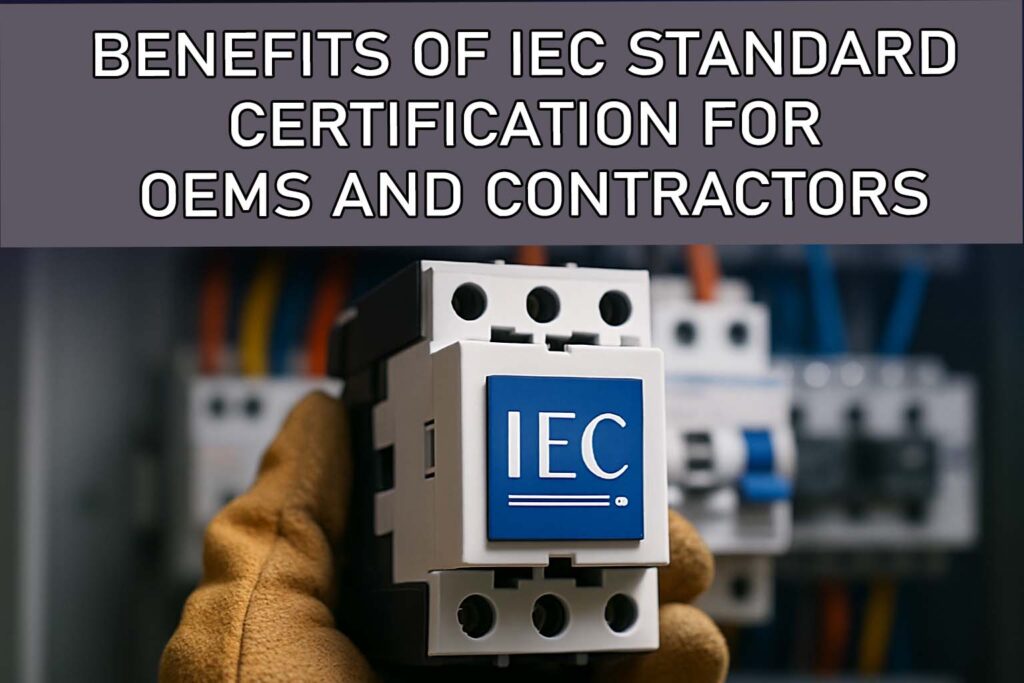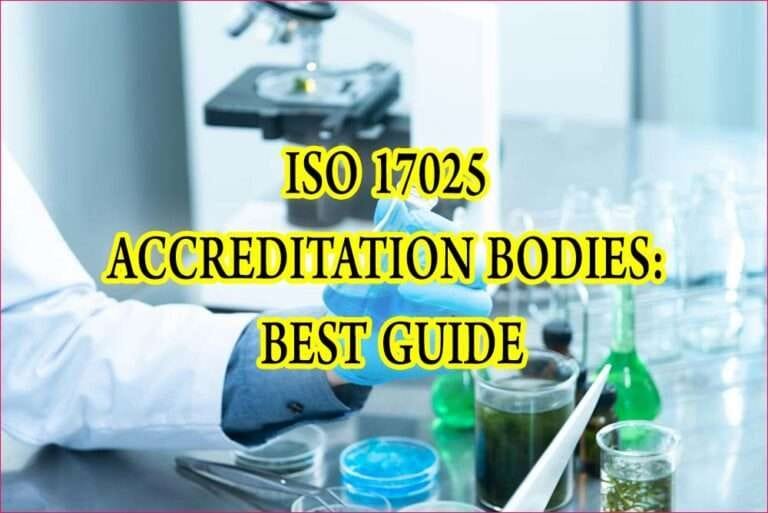Benefits of IEC Standard Certification for OEMs and Contractors
In today’s global market, quality and safety are critical. Original Equipment Manufacturers (OEMs) and electrical contractors operate in an industry where reliability, performance, and compliance are non-negotiable. One way to ensure these standards are consistently met is through IEC certification. The benefits of IEC standard certification for OEMs and contractors are wide-ranging, covering everything from product acceptance to operational efficiency and international market access.

IEC, or the International Electrotechnical Commission, develops and publishes international standards for electrical, electronic, and related technologies. These standards ensure interoperability, safety, and quality, making them essential for any company involved in manufacturing or installing electrical systems.
Why Certification Matters for OEMs and Contractors
Obtaining IEC certification is not just about compliance. It reflects a company’s dedication to excellence, safety, and global competitiveness. For OEMs and contractors, this certification builds confidence among clients, regulators, and end-users. With increasing demand for efficient and standardized solutions, it becomes a critical differentiator in a saturated market.
Know more about Motor Overload Setting Table
Key Benefits of IEC Standard Certification for OEMs and Contractors
The benefits of IEC standard certification for OEMs and contractors go far beyond meeting a legal or contractual requirement. It provides both commercial and technical advantages.
Global Market Access
One of the most important benefits is global market access. IEC certification enables OEMs and contractors to enter international markets without additional testing or validation. This is because many countries recognize IEC standards, reducing technical barriers to trade.
For instance:
| Country | Recognizes IEC Standards | Local Certification Needed? |
|---|---|---|
| Germany | Yes | No (if IEC compliant) |
| India | Yes | BIS may still be required |
| UAE | Yes | ESMA verification needed |
| Australia | Yes | Only safety checks required |
This significantly reduces time to market and costs associated with multiple testing processes.
Know more about Demand Factor as Per NEC
Technical Consistency and Interoperability
IEC standards provide a technical baseline. For OEMs, this means consistent product performance, easier component sourcing, and interoperability with other certified equipment. For contractors, standardized installation processes lead to faster project execution and fewer errors.
When electrical equipment from different manufacturers complies with the same IEC standards, it ensures seamless integration. For example, an IEC 60947 certified motor starter can operate effectively with an IEC 60204 compliant control panel.
Enhanced Product Quality
For OEMs, adhering to IEC standards results in higher product quality. These standards define rigorous design, testing, and performance criteria. From mechanical robustness to electrical endurance, every aspect is tested.
This leads to:
- Reduced product failure rates
- Fewer customer complaints
- Longer equipment life
Quality improvements also boost brand reputation and customer satisfaction — both essential for sustainable growth.
Know more about Article 430.32
Improved Safety and Risk Management
Contractors benefit directly from the safety standards established by IEC. Whether it’s a low-voltage switchboard or a high-voltage transformer, IEC standards define clear requirements for safety.
This helps in:
- Reducing workplace accidents
- Avoiding electrical hazards
- Ensuring worker and end-user safety
Standards like IEC 61439 (for low-voltage switchgear assemblies) or IEC 60364 (electrical installations of buildings) provide a strong safety framework that contractors can trust.
Competitive Advantage in Bidding
One of the underrated benefits of IEC standard certification for OEMs and contractors is its impact on project bidding. In government tenders or international EPC contracts, IEC compliance is often mandatory.
Certified OEMs and contractors are more likely to:
- Win international projects
- Be preferred by consultants
- Qualify for high-value contracts
This certification serves as evidence of capability, reliability, and adherence to international norms — a strong selling point in competitive markets.
Know more about Article 220
Cost Savings in Long-Term Operations
While certification may seem expensive initially, it results in long-term savings. With reduced rework, fewer failures, and improved design efficiency, companies spend less on maintenance and replacement.
Here’s a comparison of cost impact:
| Metric | Non-Certified Equipment | IEC Certified Equipment |
|---|---|---|
| Rework frequency | High | Low |
| Downtime (annual avg.) | 20-30 hours | <10 hours |
| Customer complaints | Frequent | Rare |
| Warranty claims | Higher | Lower |
These operational efficiencies lead to better customer relationships and reduced lifecycle costs.
Know more about NEC 250.66 Table
Compliance with Local and International Regulations
IEC certification often aligns with national standards. Countries like the UK, India, UAE, and Australia have their own codes but base them on IEC frameworks. This dual compliance helps OEMs and contractors avoid legal penalties, project delays, and costly redesigns.
For example, IEC 61508 (functional safety) helps in complying with regional safety laws such as:
- UK’s PUWER (Provision and Use of Work Equipment Regulations)
- India’s CEA Guidelines for electrical systems
- UAE’s DEWA electrical installation regulations
Being IEC certified provides legal peace of mind.
Strengthening Trust and Credibility
Customers today are more informed. They demand safety, performance, and sustainability. Certification from a respected international body like the IEC helps build that trust.
For OEMs:
- It assures that products meet global benchmarks.
- It reflects technical competence and attention to detail.
For contractors:
- It assures clients of safe installation practices.
- It validates their expertise in delivering high-quality work.
This enhances brand credibility and customer loyalty — intangible assets that are invaluable in today’s digital age.
Sustainable Design and Innovation
IEC standards also promote sustainable design. By following these standards, OEMs create energy-efficient, recyclable, and environmentally friendly products. This supports green building certifications like LEED, BREEAM, and EDGE.
Contractors installing IEC-certified systems can help clients meet energy codes and sustainability targets — a growing requirement in modern infrastructure projects.
Long-Term Strategic Growth
Another powerful benefit of IEC standard certification for OEMs and contractors is the alignment with long-term growth strategies. Certified companies tend to be more organized, process-oriented, and innovation-driven. They can adapt to new market trends and regulatory changes more easily.
This strategic agility is crucial in a rapidly evolving world where digitalization, renewable integration, and electrification are reshaping the electrical industry.
Related Topics to Deepen Your Understanding
To further explore how IEC certification interacts with broader technical topics, check out our guides on:
- PI Test of Transformer
- Fault Current at Transformer Secondary
- Fault Current Distribution in Star Delta Transformer
- Differential Relay Setting Calculation for Transformer
These articles delve into real-world electrical engineering challenges that IEC standards help address. They also show how compliance enhances safety and performance.
Conclusion
The benefits of IEC standard certification for OEMs and contractors are both tangible and strategic. It’s not just about ticking a box — it’s about setting a foundation for quality, safety, and global competitiveness. From technical consistency to global recognition, and from reduced risk to increased client trust, IEC certification empowers companies to lead in a demanding marketplace.
Whether you’re manufacturing electrical panels or installing solar systems, aligning your work with IEC standards is a smart investment. It ensures you’re not just meeting industry expectations but exceeding them — with every component, every installation, and every project.
Follow Us on Social:
Subscribe our Newsletter on Electrical Insights for latest updates from Electrical Engineering Hub
#IECStandards, #OEMCompliance, #ContractorBenefits, #ElectricalStandards, #IECCompliance, #QualityCertification, #SafetyStandards, #GlobalStandards, #IECForManufacturers, #StandardizationMatters, #OEMStandards, #ContractorCompliance, #ProductCertification, #ElectricalSafety, #TechnicalStandards



